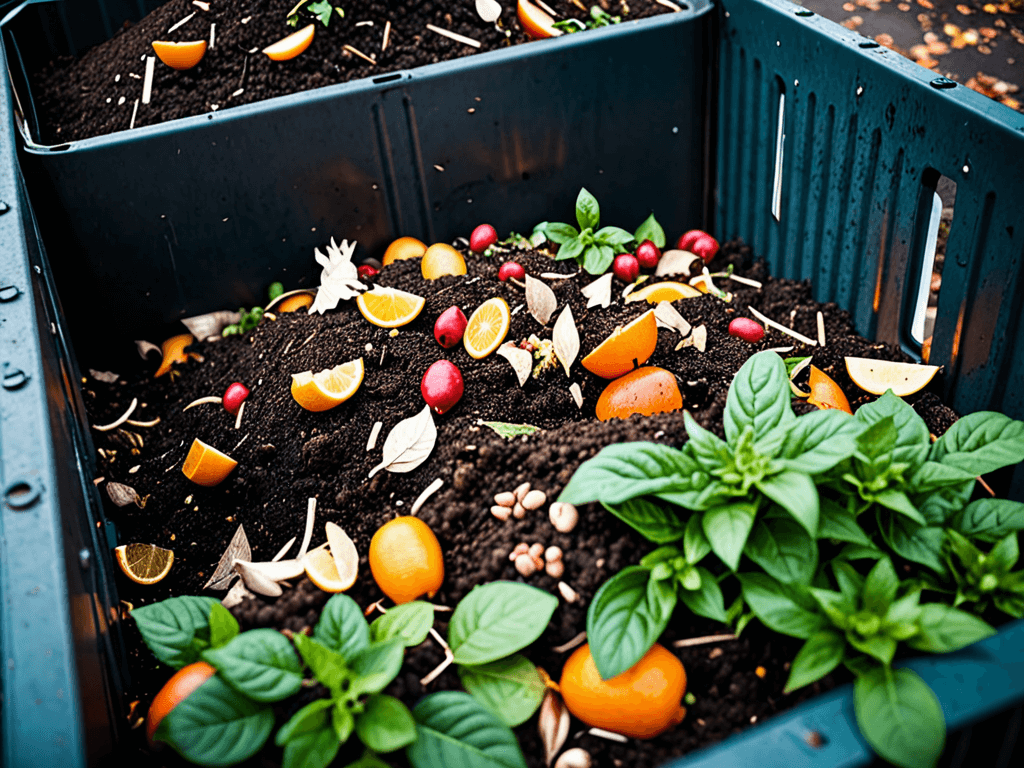Urban Composting has emerged as a sustainable solution to city waste management, offering a plethora of benefits including waste reduction and soil enrichment.
As more cities turn to composting, understanding its process, benefits, and challenges is crucial.
This guide aims to navigate through the essential aspects of Urban Composting, providing insights into community participation and innovative trends that shape the future of urban waste management.
Understanding Urban Composting Basics
Urban composting is a method of recycling organic waste within city environments to create nutrient-rich compost. This process begins by collecting organic materials such as food scraps, paper, and plant matter, which are abundant in urban areas.
Composting involves the natural decomposition of these materials through the action of microorganisms, which thrive in moist, aerated conditions.
By understanding the basics of urban composting, city residents can convert waste into valuable resources for gardens and community green spaces.
Reducing landfill waste and supporting urban agriculture significantly benefit the environment and community health.
Benefits of Composting in a City Environment
Urban composting in city environments provides numerous benefits, promoting both environmental sustainability and community well-being. One major advantage is the reduction of waste sent to landfills. By composting organic materials, cities can significantly lower their overall waste footprint.
Additionally, the process generates rich compost that acts as a natural fertilizer for urban gardens, enhancing plant growth and soil health. This not only reduces the need for chemical fertilizers but also helps in improving air quality by supporting more green spaces.
Moreover, composting can be a community-building activity, bringing together local residents to participate in and benefit from a shared initiative.
How to Start an Urban Composting Project
Starting an urban composting project involves several simple steps. Begin by selecting a suitable location, ideally a spot that’s convenient for daily access but not too close to living areas to avoid odors.
Next, you’ll need a composting bin; this can be a simple homemade structure or a purchased bin designed for urban spaces.
For materials, gather a mix of green waste like fruit peels and vegetable scraps with brown waste like dried leaves and cardboard. Maintain a balance by adding more brown materials to avoid excess moisture.
Regularly turning the pile is key to aerate the compost and speed up decomposition.
Engage the community by organizing workshops and distributing informative materials to encourage participation and proper composting techniques.
With patience and care, these efforts will transform waste into valuable compost.
Essential Materials for City Composting
For successful city composting, gathering the right materials is crucial. Start with selecting a compost bin; city composters often prefer compact or stackable bins to save space.
Essential materials include a balance of green waste like fruit and vegetable scraps, as well as brown waste such as dried leaves, wood chips, and shredded newspaper or cardboard. The green waste provides nitrogen, while the brown waste offers carbon, both vital for balanced composting. A mix of both ensures efficient decomposition.
Minding the moisture level is also important, so occasionally add water to maintain a moist but not soggy environment.
To accelerate the composting process, consider adding slightly decayed compost to introduce beneficial microorganisms from an existing compost pile.
Common Challenges and Solutions
Urban composting faces several common challenges, but with the right strategies, they can be managed effectively.
One such challenge is controlling odors, which can be mitigated by maintaining a proper balance between green and brown waste and ensuring proper aeration.
Pests like rodents can also pose a problem; using tightly sealed bins and covering food scraps with a layer of brown materials can help deter them.
Lack of space is another issue in city environments, but vertical composting systems or community composting projects can maximize minimal space.
Additionally, educating participants about compost-friendly materials helps avoid contamination from non-degradable items.
By addressing these issues proactively, urban composting can thrive and provide sustainable benefits to city life.
Community Involvement in Urban Composting
Community involvement is crucial to the success of urban composting programs. By engaging local residents, composting initiatives can benefit from increased awareness and participation.
Workshops, led by knowledgeable volunteers or local organizations, can provide valuable information on proper composting techniques and the environmental benefits of reducing waste. These events foster a sense of community and collective responsibility.
Additionally, setting up community compost stations in parks or shared spaces makes composting more accessible to residents without the space for personal bins. Through cooperation and shared goals, community involvement not only boosts composting rates but also strengthens the bond among city dwellers, enhancing urban sustainability efforts.
Success Stories from Urban Composting Initiatives
Success in urban composting initiatives can be seen in numerous cities around the world. One example is San Francisco, which has implemented a mandatory composting program that has drastically reduced landfill waste and transformed the city’s approach to waste management.
In Toronto, the community’s involvement in local composting efforts has increased awareness and participation, subsequently enhancing urban gardening and sustainability projects.
Such initiatives are often supported by municipal policies that encourage composting by supplying residents with the necessary resources and educational materials.
These success stories illustrate how coordinated efforts and civic engagement can lead to significant environmental benefits and inspire more cities to cultivate their own urban composting success.
Future of Urban Composting: Trends and Innovations
The future of urban composting is bright with emerging trends and innovations that aim to make waste management more efficient and sustainable. One trend is the use of smart composting bins equipped with sensors to monitor moisture and temperature, ensuring optimal conditions for decomposition.
Innovations in compostable packaging are also gaining traction, reducing the volume of non-biodegradable waste.
Moreover, urban composting is being integrated into city planning, with more green spaces and community gardens incorporated into urban development projects.
Education and digital platforms are playing a significant role in spreading awareness and encouraging participation in these initiatives.
These advancements are helping cities move towards a more circular economy, where waste is reduced, reused, and recycled effectively.
Embracing the Future of Urban Composting
Urban composting presents an effective solution for managing waste sustainably in city environments. By turning organic waste into valuable resources, cities can reduce their carbon footprint and support local agriculture.
As more individuals and communities get involved, the impact grows, demonstrating the power of collective action in achieving environmental goals.
Innovations and technology are set to drive the future of urban composting, making it more accessible and efficient, which in turn will attract broader participation.
Embracing these changes today will pave the way for greener and more sustainable urban living environments, inspiring similar efforts worldwide.
FAQ – Frequently Asked Questions about Urban Composting
What is urban composting?
Urban composting is the process of recycling organic waste in city environments to create compost used in urban agriculture and gardens.
How does composting benefit urban areas?
Composting reduces waste sent to landfills, enriches soil for urban gardens, and decreases reliance on chemical fertilizers.
What materials can be composted in the city?
Fruit and vegetable scraps, coffee grounds, eggshells, grass clippings, and dry leaves are all suitable for urban composting.
Are there any challenges with urban composting?
Common challenges include managing space, odor control, and preventing pest issues in high-density areas.
How can I start composting in my city apartment?
Use compact composting bins or participate in community composting programs to manage waste efficiently.
Can composting be a community activity?
Yes, community composting projects bring people together, educate residents, and promote sustainable living practices within neighborhoods.


